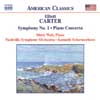Carter Symphony No 1; Piano Concerto
Elliott Carter makes his Naxos début with an ear-catching programme
View record and artist detailsRecord and Artist Details
Composer or Director: Elliott (Cook) Carter
Genre:
Orchestral
Label: Naxos
Magazine Review Date: 3/2004
Media Format: CD or Download
Media Runtime: 63
Mastering:
Stereo
DDD
Catalogue Number: 8 559151

Tracks:
| Composition | Artist Credit |
|---|---|
| Holiday Overture |
Elliott (Cook) Carter, Composer
Elliott (Cook) Carter, Composer Kenneth Schermerhorn, Conductor Nashville Symphony Orchestra |
| Symphony No 1 |
Elliott (Cook) Carter, Composer
Elliott (Cook) Carter, Composer Kenneth Schermerhorn, Conductor Nashville Symphony Orchestra |
| Concerto for Piano and Orchestra |
Elliott (Cook) Carter, Composer
Elliott (Cook) Carter, Composer Kenneth Schermerhorn, Conductor Mark Wait, Piano Nashville Symphony Orchestra |
Author: Arnold Whittall
It’s very good news that Naxos has added Elliott Carter to its American Classics series, beginning with a strong programme of rarely heard pieces, and juxtaposing Carter in early populist vein with Carter the 1960s’ avant-gardist in full cry.
The wartime muscularity of the Symphony No 1 (completed in 1942 but heard here in its 1954 revision) is clearest in passages which echo, or anticipate, Copland’s more extrovert orchestral scores of the same period. But that triumphalist spirit is most productively on show in Carter’s splendidly brash Holiday Overture (1944). The Symphony as a whole is less straightforward, more varied in style and character, and the slow movement in particular moves from hymnic meditation into more ambiguous regions of expression in a manner that might not be completely convincing. It is certainly distinctive, however, and fits well with the balance between restraint and exuberance that typifies the work as a whole.
By the mid-1960s, when the Piano Concerto was composed, Carter’s language had shed its tonal roots, and his forms were far more distant from those traditions that are still traceable in the Symphony. Textures are immensely elaborate, yet the music is uninhibitedly dramatic, depicting all kinds of conflicts and attempted reconciliations while subjecting the basic concept of the concerto to penetrating critical scrutiny.
The power of the drama emerging from the constantly fluctuating confrontations between soloist, main orchestra, and a mediating concertino-group of seven players is rather muted in this recording, which (I suspect) is not the result of a preparatory series of public performances. Ursula Oppens, with Michael Gielen, managed to convey rather more of the music’s inherent fire and tumult. But Mark Wait shows a finely gauged technical command, and although Kenneth Schermerhorn and his Nashville players are occasionally underpowered and inclined to play safe, the jubilant conclusion of the Holiday Overture sweeps any interpretative reservations aside. With the symphony not otherwise available, this disc is a thoroughly recommendable addition to the Naxos American canon.
The wartime muscularity of the Symphony No 1 (completed in 1942 but heard here in its 1954 revision) is clearest in passages which echo, or anticipate, Copland’s more extrovert orchestral scores of the same period. But that triumphalist spirit is most productively on show in Carter’s splendidly brash Holiday Overture (1944). The Symphony as a whole is less straightforward, more varied in style and character, and the slow movement in particular moves from hymnic meditation into more ambiguous regions of expression in a manner that might not be completely convincing. It is certainly distinctive, however, and fits well with the balance between restraint and exuberance that typifies the work as a whole.
By the mid-1960s, when the Piano Concerto was composed, Carter’s language had shed its tonal roots, and his forms were far more distant from those traditions that are still traceable in the Symphony. Textures are immensely elaborate, yet the music is uninhibitedly dramatic, depicting all kinds of conflicts and attempted reconciliations while subjecting the basic concept of the concerto to penetrating critical scrutiny.
The power of the drama emerging from the constantly fluctuating confrontations between soloist, main orchestra, and a mediating concertino-group of seven players is rather muted in this recording, which (I suspect) is not the result of a preparatory series of public performances. Ursula Oppens, with Michael Gielen, managed to convey rather more of the music’s inherent fire and tumult. But Mark Wait shows a finely gauged technical command, and although Kenneth Schermerhorn and his Nashville players are occasionally underpowered and inclined to play safe, the jubilant conclusion of the Holiday Overture sweeps any interpretative reservations aside. With the symphony not otherwise available, this disc is a thoroughly recommendable addition to the Naxos American canon.
Discover the world's largest classical music catalogue with Presto Music.

Gramophone Digital Club
- Digital Edition
- Digital Archive
- Reviews Database
- Full website access
From £8.75 / month
Subscribe
Gramophone Full Club
- Print Edition
- Digital Edition
- Digital Archive
- Reviews Database
- Full website access
From £11.00 / month
Subscribe
If you are a library, university or other organisation that would be interested in an institutional subscription to Gramophone please click here for further information.




